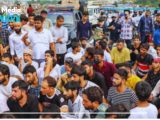
Police Target Activists with Unjust Raids under Unlawful Activities Act in IIOJK
November 19, 2024In Indian Illegally Occupied Jammu and Kashmir (IIOJK), the police on Tuesday launched a series of raids in south of IIOJK’s Awantipora and Pulwama districts, targeting individuals in connection with fake charges filed under the repressive Unlawful Activities (Prevention) Act (UAPA).
The raids focused on the residences of Advocate Ghulam Nabi Shaheen in Khankah Midora and Mohammad Jahangir Ahanger in Dadasara, both in Pulwama. These actions were carried out under the instructions of the National Investigation Agency (NIA) court, further cementing the widespread misuse of India’s draconian laws to silence dissent and intimidate activists.
During the raid at Advocate Shaheen’s residence, authorities claimed to have recovered three books—an action that has raised more questions than answers. This seems to be a clear attempt to criminalize intellectual freedom and penalize those who challenge the status quo.
The use of the Unlawful Activities (Prevention) Act in these raids highlights the growing authoritarianism in the region. The law has long been criticized for being used as a tool to target political opponents, activists, and anyone advocating for the rights of Kashmiris. Under the UAPA, individuals can be detained for long periods without trial, and often, the evidence against them is fabricated or non-existent.
The raids, which come amid a broader crackdown on political activists and intellectuals, are a blatant attempt to intimidate and suppress the growing resistance in IIOJK. The Indian government’s strategy is clear: silence dissent through fear and force, labeling anyone opposed to its policies as ‘terrorists’ or ‘anti-national.’
Advocate Shaheen and Ahanger are both known for their vocal support for the rights of Kashmiris, and their continued harassment underscores the lengths to which the Indian state will go to crush any form of resistance. The ongoing investigations into these individuals are merely another chapter in India’s attempt to destroy IIOJK’s political and cultural identity.
Despite the repression, the people of IIOJK remain resolute. These tactics will not silence their voices or deter them from demanding their rights. The UAPA and similar laws are being used as instruments of fear, but they have only sparked greater defiance among the people of IIOJK.
The raids and investigations are not just an attack on individuals—they are an attack on freedom of expression and the right to resist oppression. The international community must hold India accountable for these unlawful actions and demand an end to the abuse of power in Indian Illegally Occupied Jammu and Kashmir.

